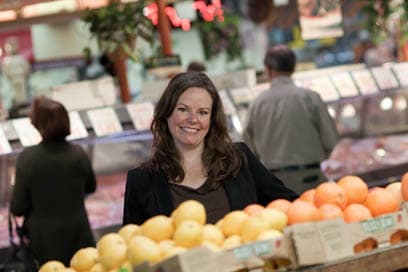Carly Dunster is a food lawyer with her own practice. She helps a variety of clients, from urban agriculture projects to small business owners, make their foodie dreams a reality. She also works on a variety of advocacy projects, helping entrepreneurs navigate food laws to encourage innovation, like supporting a more dynamic street food scene in Toronto. So basically, she’s the patron saint of Food Trucks. She told us how she turned her passion into a profession.
What does a typical Thursday look like, from waking up to going to bed?
When I work as a food lawyer (I also work part-time as an employment lawyer), I work from home, so I usually make breakfast and read the paper first thing. Once that’s done I do a scan of food law-related news, via various sources (I have a zillion Google alerts and try and stay active in social media, which is a key resource). Because there is no real template for the food law practice, I feel like I constantly have to be learning and seeking out new sources of information.
There is almost always some kind of networking activity in any given day. It’s crucial for any sole practitioner to put themselves out there on a regular basis, but because my practice is what some might call “alternative,” it’s even more important. A lot of people haven’t heard of food law before they meet me, so it’s imperative that I devote plenty of time to making sure they know. I attend a lot of community meetings, town halls, conferences, and set aside a good chunk of time to connect with others working in the food sector.
Then, client work. Right now I am working on behalf of a food co-operative, an urban agriculture project, and a woman starting a small food business, to name a few. The client work is balanced out by various advocacy projects that I’m a part of, working on things like demystifying food laws to encourage innovation and entrepreneurialism in the food sector and creating a more dynamic street food scene in Toronto. I probably spend equal amounts of time on client work and advocacy.
What was your first job out of school?
One of my first jobs out of law school was at a butcher shop, no joke. I had just read an awesome book called Heat, by Bill Buford, where he ditches his career as a journalist to become a butcher. I couldn’t really figure out how to be a lawyer, to be honest, and I just walked into the place and asked if they were hiring. I thought it would be cool to be this empowered female butcher. Two weeks later, while mopping up chicken fat, I quit. Short-lived, but a pretty interesting experience nonetheless!
What are the 3 skills you require most to do your job well?
Self-discipline. It’s so key when you’re self-employed. You have to hold yourself accountable – to your clients, to your deadlines, and to the practice as a whole.
The ability to genuinely connect with and relate to people. This sounds somewhat unsavoury, but you have to sell yourself when you’re self-employed, and also be prepared to prove to people that you are the person they should want to work with.
Tenacity. When you’re working for yourself, and carving out a new path, you need serious drive and a sometimes ridiculous level of optimism. More of a mindset than a skill, really.
What do you love most about your career?
I love working with the food community in Toronto. I get to be a part of fantastic projects and connect with massively inspiring people all the time. Ultimately, I love that my job is about food. I started the practice because I was trying to figure out a way to merge my deep, unending obsession with all things food and my legal skills, and so far, so good.
Do you have any warnings?
From a financial perspective, starting your own law firm, particularly if you’re not coming into it with a solid client base, is difficult. I naively thought I’d be able to make it work straight out of the gates, but that just wasn’t feasible. I’ve been able to balance my food law practice with a really satisfying part-time job as an employment lawyer, and that works for me. One supports the other, but both are valuable, great places to work. I guess my warning to would-be sole practitioners is to be prepared to take a financial hit, and have a three to five-year game plan to account for that.
If you could try a different career on for a year, what would it be?
I’d love to be a writer. Or a journalist. Or maybe a professional tennis player. I also have a fairly persistent folk singer fantasy.
~ Photo by Bouke Salverda




 Follow Us On Instagram
Follow Us On Instagram
